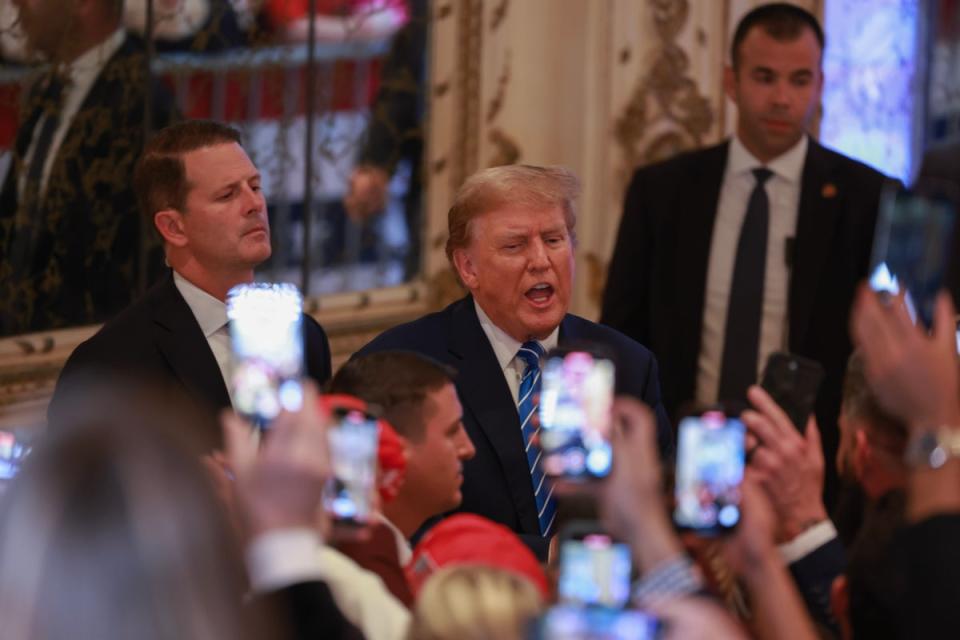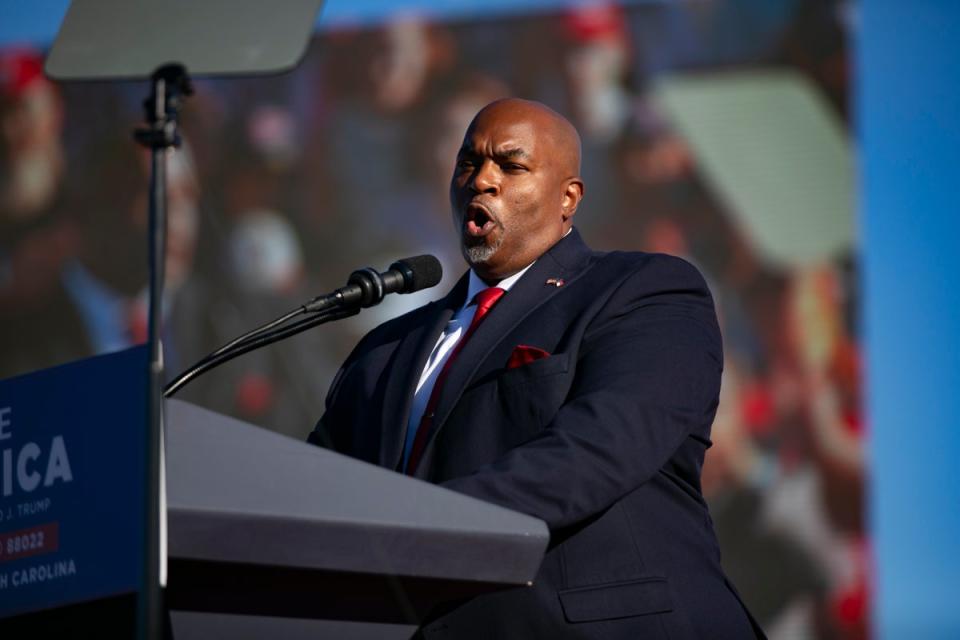Trump storms toward Republican nomination as Haley’s Super Tuesday hopes dwindle
Former president Donald Trump continued his march to the Republican nomination with victories in California, Texas, North Carolina, Virginia and a host of other Super Tuesday contests while Nikki Haley picked up a rare victory in Vermont.
The twice-impeached and four-times-indicted ex-president scored a near clean sweep on the most significant primary night of the campaign, trouncing the former South Carolina governor and edging closer to securing the delegates he will need for the Republican nomination.
Republicans held primary contests in 15 states on Super Tuesday – including Alabama, Arkansas, California, Colorado, Maine, Massachusetts, Minnesota, North Carolina, Oklahoma, Tennessee, Texas, Vermont and Virginia – as well as caucuses in Alaska and Utah. Super Tuesday typically marks the halfway point in primary contests and candidates who dominate on Super Tuesday typically go on to win the nomination of their party.
Super Tuesday puts up 865 delegates up for grabs, with the biggest states being Texas at 161 delegates and California with 169 delegates. The nominee for the Republican Party needs 1,215 delegates.
Mr Trump touted his decisive victory in a speech at his Mar-a-Lago home in Florida.
“They call it 'Super Tuesday' for a reason,” Mr Trump said. “This is a big one. They tell me, the pundits and otherwise, that there's never been one like this. There's never been anything so conclusive.”
At the same time, Ms Haley picked up her second primary victory in Vermont, a heavily white state in New England with a high level of college education, following her victory this weekend in the District of Columbia primary.

But Vermont and some of the other states where Ms Haley performed best held “open primary” contests, wherein independents could participate in party primaries. Vermont in particular has no party registration, which allowed for non-Republicans to participate in the primary. Virginia, where Ms Haley won a third of the vote, also holds an open primary.
Conversely, Mr Trump performed much better in states like North Carolina, where unaffiliated voters can participate in the GOP primary but not Democrats. The former president won almost three quarters of the vote in the Tar Heel state. Similarly, California’s Republican primary is closed and does not allow for unaffiliated voters to participate.
Ms Haley also lost Maine despite the fact that the state’s senior Republican Senator Susan Collins supported her. Senator Lisa Murkowski of Alaska also announced her support for Ms Haley on Friday, but the largely rural state with remote areas will take days to announce its election results.
Olivia Perez-Cubas, a spokeswoman for the Haley campaign, released a statement touting the fact Ms Haley became the first Republican woman to win two primaries and noted Mr Trump’s weaknesses.
“Today, in state after state, there remains a large block of Republican primary voters who are expressing deep concerns about Donald Trump,” she said. “That is not the unity our party needs for success. Addressing those voters’ concerns will make the Republican Party and America better.”
Mr Trump’s victories come as some polling shows him beating President Joe Biden. A New York Times/Siena College survey released this weekend showed Mr Trump beating Mr Biden handily. Mr Trump handily beats Vice President Kamala Harris in the same survey.
In addition to Mr Trump’s personal victories, lower-ballot candidates also showed his infliuence. In North Carolina, Lieutenant Governor Mark Robinson – a hard-right Maga Republican who has made a series of homophobic and antisemitic remarks – won the Republican nomination for governor in a state Mr Trump won.

Mr Trump’s victories also come as Mitch McConnell, the leader of Republicans in the Senate, announced he would step aside as the head of the Republican conference in the upper chamber. Both of his potential successors – Senate Minority Whip John Thune and Texas Senator John Cornyn – endorsed Mr Trump.
But Mr Trump’s performances in states he wins also continue to reveal his weaknesses with suburban and college-educated voters. In Virginia, he won almost all regions except for the Washington, DC, suburb of Alexandria and neighbouring Fairfax County. Ms Haley also won Albemarle County, where Charlottesville and the University of Virginia are located. A largely white, highly-educated New England state with a Republican governor despite its liberal reputation bolstered Ms Haley to victory.
On the Democratic side, Mr Biden continued his victories of primary states, though he lost American Samoa to little-known businessman Jason Palmer. In his statement on Tuesday evening, Mr Biden specifically took aim at Mr Trump, whom he beat in the 2020 general election, saying that Mr Trump poses a threat to democracy.
“He is driven by grievance and grift, focused on his own revenge and retribution, not the American people,” Mr Biden said in a statement. “He is determined to destroy our democracy, rip away fundamental freedoms like the ability for women to make their own health care decisions, and pass another round of billions of dollars in tax cuts for the wealthy — and he’ll do or say anything to put himself in power.”
In addition, Mr Biden’s performance showed some voters remain dissatisfied with his handling of Israel’s assault on Gaza after Hamas launched a surprise attack on October 7. In Minnesota, 19 per cent of Democratic primary voters voted “uncommitted,” much larger than the effort in Michigan last week.
Mr Trump’s victories come as he has had a streak of good luck in recent weeks. On Monday, the US Supreme Court ruled that Mr Trump could stay on the ballot, which reversed Colorado’s supreme court’s decision that removed him from the primary ballot after it said his actions on January 6 amounted to him violating the insurrection clause of the 14th amendment of the US Constitution.
In addition, last week, the Supreme Court agreed to hear a case from the former president to determine whether his actions leading up to and on January 6 are subject to presidential immunity. This came after a grand jury indicted Mr Trump last year for his plot to subvert the 2020 presidential election results after an investigation by Special Counsel Jack Smith.
